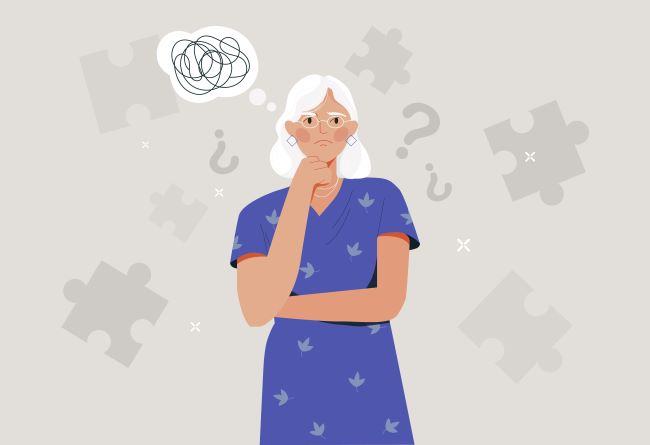One in five older adults reports lingering psychological effects from the COVID-19 pandemic, including depression, anxiety, insomnia, and substances abuse. Even though there are now more open discussions about the importance of mental health in our society, many seniors remain reluctant to seek help. Some view mental health issues as a personal failure or weakness, which generates feelings of shame. The stigma associated with mental health issues is preventing a significant number of seniors from seeking the treatment they need.
Causes of Mental Health Issues in Older Adults
Many seniors consider depression and anxiety to be part of aging. Many life events occur as we age that contribute to this feeling:
- Grief and loss – Older adults may lose a spouse, close friends, and family members.
- Declining health – Resulting in chronic pain and loss of mobility.
- Retirement – Leading to loss of status, sense of purpose, and social connections previously found at the workplace.
- Financial difficulties – This could be due to the loss of income after the death of a spouse or reduced income due to retirement.
- Loneliness and isolation – Loss of friends and family members, difficulty leaving the home due to mobility issues, and lack of transportation can all lead to fewer social interactions.
Recognizing the Signs
As we age, mental health issues often present as physical symptoms, which makes them difficult to recognize. We may not associate fatigue, headaches, dizziness, and shortness of breath with psychological causes, making misdiagnosis common. Furthermore, seniors often neglect to report symptoms to their doctor or dismiss symptoms as a normal part of aging.
A few important symptoms to look out for include:
- Noticeable changes in mood, energy level, or appetite.
- Isolation, social withdrawal, and little interest in things you used to enjoy.
- Difficulty sleeping or sleeping too much.
- Increased worries or stress.
- Feelings such as anger, irritability, sadness, hopelessness, and thoughts of suicide.
- Misuse of alcohol or drugs.
Mental health issues affect our mood, thinking, and behavior. They can vary in degree of severity. Everyone has experienced some anxiousness and nervousness as a normal part of life. If your symptoms persist and cause you to feel overwhelmed or unable to cope with daily activities, though, you should seek help.
What Medicare Covers
Treatment for mental health issues consists of therapy, medication, or a combination of the two. Medicare covers inpatient and outpatient treatment as well as any prescription drugs you need to treat your condition.
Medicare Part A covers mental health services received in an inpatient hospital setting.
Medicare Part B covers outpatient treatment at a doctor’s office, such as with a psychologist, psychiatrist, or social worker. It also covers telehealth visits with a licensed therapist in the privacy of your home. This can be helpful for those who may be limited by a lack of transportation or mobility issues. Part B also covers certain prescription drugs, such as injections administered in a doctor’s office or outpatient setting.
Medicare Part D covers prescription drugs, but you’ll need to check your insurance carrier’s drug formulary to find out the coverage for specific drugs.
What you pay depends on whether you have Original Medicare A and B, a Medigap plan, or Medicare Advantage. Medicare Advantage plans may offer additional benefits. Always check with your insurance carrier for benefit details.
Medicare also offers several opportunities for you to discuss your mental health with your primary care doctor. These visits are considered preventive services and are covered in full by Medicare. They consist of:
- A one-time “Welcome to Medicare” preventive visit within the first 12 months that you have Part B. This visit includes a review of your potential risk factors for depression.
- A yearly “Wellness” visit. This is a good opportunity to talk to your doctor about changes to your mental health. Your doctor will then be able to evaluate any changes that occur from year to year.
- One depression screening each year. You must receive the screening from a primary care doctor, who will then provide you with follow-up treatment and referrals.
- One alcohol misuse screening each year for adults who use alcohol but don’t meet the medical criteria for alcohol dependency. If your health care provider determines that you’re misusing alcohol, you can receive up to four brief face-to-face counseling sessions per year.
Help Is Available
If you are experiencing mental health issues, you are not alone. Seniors are more likely to suffer from depression, anxiety, and other mental health issues than any other age group. Your mental health is just as important as your physical health – think of it like any other medical condition. Untreated mental health issues can affect your physical well-being, leading to a lower quality of life and increased mortality. Seeking help is not a sign of weakness; it is a sign of courage and strength. You deserve to live your best possible life.
The best place to start when seeking care is with your primary care doctor, who can provide initial mental health screenings and referrals to mental health specialists. Other resources include the National Institute of Mental Health and the 988 Suicide & Crisis Lifeline, which can put you in touch with a mental health counselor 24/7. This hotline can also refer you to treatments and services in your area.
PTT Financial is here to support you through every stage of life. Contact us today.

